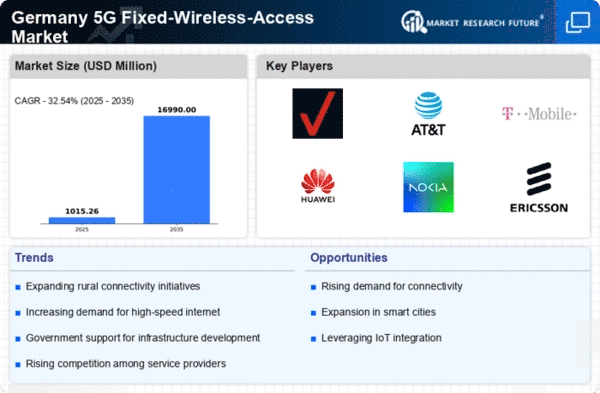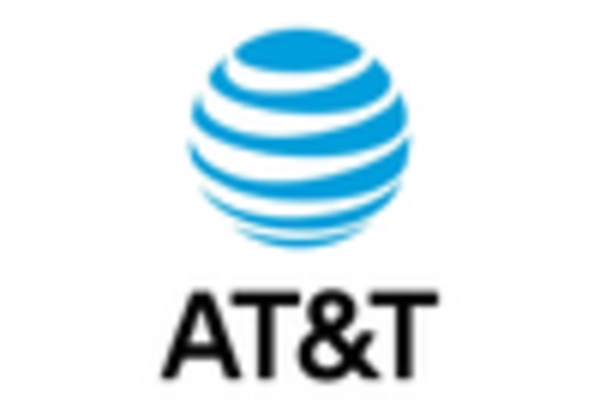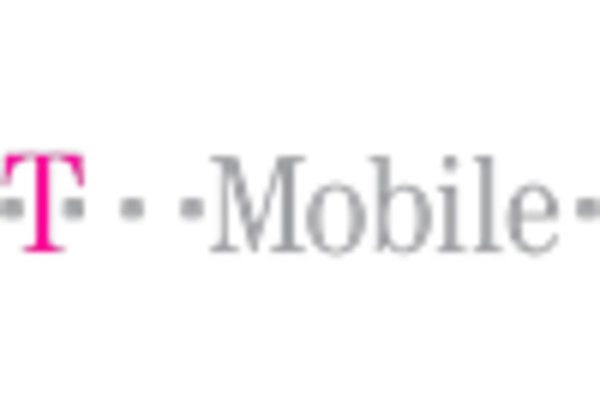Increased Focus on Smart Cities
The push towards smart city initiatives in Germany is significantly influencing the 5g fixed-wireless-access market. As urban areas strive to integrate technology into infrastructure, the demand for reliable and high-speed internet becomes paramount. Smart city projects often rely on IoT devices, which require robust connectivity solutions. The German government has allocated substantial funding for these initiatives, with estimates suggesting investments could reach €1 billion by 2027. This financial commitment indicates a strong belief in the potential of 5g fixed-wireless-access to support the infrastructure needed for smart cities. Consequently, the market is likely to see increased adoption as municipalities seek to enhance urban living through technology.
Growing Demand for High-Speed Internet
The increasing demand for high-speed internet access in Germany is a primary driver for the 5g fixed-wireless-access market. As more households and businesses seek reliable and fast internet connections, the market is expected to expand significantly. According to recent data, approximately 80% of German households express a need for improved internet speeds, which positions 5g fixed-wireless-access as a viable solution. This technology offers enhanced bandwidth and lower latency, making it particularly appealing for urban areas where traditional wired connections may be limited. The shift towards remote work and online services further amplifies this demand, suggesting that the 5g fixed-wireless-access market will continue to grow as consumers prioritize connectivity.
Rising Consumer Expectations for Connectivity
Rising consumer expectations for connectivity are shaping the landscape of the 5g fixed-wireless-access market in Germany. As digital services become integral to daily life, users demand seamless and uninterrupted internet access. Surveys indicate that over 70% of consumers prioritize internet speed and reliability when choosing service providers. This shift in consumer behavior compels telecommunications companies to invest in advanced fixed-wireless technologies to meet these expectations. The competitive nature of the market further drives innovation, as providers seek to differentiate themselves through superior service offerings. As a result, the 5g fixed-wireless-access market is poised for growth, driven by the need to satisfy increasingly discerning consumers.
Government Initiatives for Digital Transformation
Government initiatives aimed at digital transformation are a crucial driver for the 5g fixed-wireless-access market in Germany. The German government has launched various programs to enhance digital infrastructure, with a focus on expanding broadband access to underserved areas. These initiatives often include subsidies and incentives for telecommunications companies to deploy 5g fixed-wireless-access solutions. Recent reports suggest that the government aims to achieve 100% broadband coverage by 2025, which aligns with the objectives of the 5g fixed-wireless-access market. Such proactive measures not only stimulate market growth but also foster a competitive environment that encourages innovation and investment in next-generation technologies.
Technological Advancements in Wireless Communication
Technological advancements in wireless communication are propelling the 5g fixed-wireless-access market forward in Germany. Innovations in antenna technology, signal processing, and network management are enhancing the efficiency and reliability of fixed-wireless solutions. For instance, the deployment of Massive MIMO (Multiple Input Multiple Output) technology allows for improved data throughput and coverage, which is crucial for urban environments. As these technologies mature, they are likely to reduce operational costs and improve service quality, making 5g fixed-wireless-access more attractive to both providers and consumers. The ongoing evolution of wireless standards indicates a robust future for this market, as it adapts to meet the growing needs of users.
















